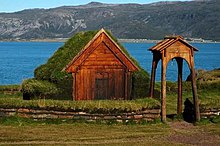The Southern coast of Greenland is jokingly nicknamed "Sineriak Bananeqarfik" (Banana Coast) by the locals. Still far from a tropical paradise, this is the region which experiences the least extreme temperatures. Be warned, though, it can still get bitterly cold.
The area is characterized by its fjords and mountains; flowering plants, fertile lands and sheep farms side by side with floating icebergs and glaciers.
Temperatures are usually between 5 and 15 degrees Celsius in summer, and between -10 and 0 degrees Celsius in winter.
Cities
[edit]- 1 Igaliku (Norse: Gardar). A small farming village on the same peninsula as Qaqortoq
- 2 Nanortalik. At the southern end of Greenland, this town is named after polar bears for a reason!
- 3 Narsarsuaq. Home to the international airport
- 4 Narsaq. Fairly large town in southern Greenland, although Qaqortoq is bigger
- 5 Qaqortoq. Largest town in the area, home to more than 3000 people
- 6 Qassiarsuk (Norse: Brattahlid).
Other destinations
[edit]- 1 Qinngua Valley – home to Greenland's only forest
Understand
[edit]Get in
[edit]By plane
[edit]1 Narsarsuaq airport (UAK IATA). The only airport in the area.
Air Greenland has daily flights from Kangerlussuaq and from Nuuk and a weekly (two in the summer) direct flight from Copenhagen. There are daily connections with Copenhagen if changing plane at Kangerlussuaq. Icelandair has in summertime weekly flights from Reykjavík (domestic airport) to Narsarsuaq. Going from the airport to other places is by boat or helicopter.
By boat
[edit]Some cruise ships go to southern Greenland in the summer, for example to Nanortalik or Qaqortoq. In the autumn, a few cruise ships go from Europe to the Caribbean, and stop at Greenland. Some use the majestic Prince Christian Sound, a 100 km long, 1-2 km wide sound, with high-class sceneries.
Get around
[edit]By helicopter
[edit]- Air Greenland operates helicopter flights from the Narsarsuaq airport to settlements.
By boat
[edit]Most cities and villages in the area are situated by or near the fjords, and local travel is therefore mostly by boats. The tourist offices in the cities arrange local boat transport, but you may be able to hitch a ride on a private boat. Blue Ice Explorer operates tour boats in the area. No matter how you do it, you will be sailing in beautiful clear water in scenic fjords with icebergs floating around you. Don't worry about the icebergs; the locals have been sailing the waters all their life and know not to sail in bad weather or too close to the icebergs.
On land
[edit]Some of the villages, like Narsarsuaq and Qassiarsuk, are connected by roads, and the locals travel around on farming equipment, jeeps or 4-wheeled scooters. When there is snow cover, snowmobiles makes overland travel easier. Some places, you may be able to rent a vehicle at the tourist office.
Hiking is quite possible and hiking maps can be bought at Scanmaps, but beware of the low scale and the large differences between contour lines, which make precise navigation difficult. Also note that "tour suggestions" merely means you might be able to follow the route, as no trails are marked and streams and lakes may vary in size throughout the year.
On a lot of the islands and peninsulas, there are sheep farms. Aside from meeting an occasional flock of sheep, this has two important side effects:
- The sheep keep the mosquitos away, making the stay much more pleasant.
- The sheep are lazy, and take the easiest route from A to B. If you are lazy too (i.e. not a rock climber) use the paths the sheep have already made. Just remember that your destination is not always the same as the sheep's.
See and do
[edit]

The 1 Ice Cap can be reached from Narsarsuaq by foot (20 km there and back), boat or helicopter.
Remains of the Norse settlements can be found several places in the area. The remains of the Greenlandic cathedral is seen in Igaliku. A reconstruction of Thorhilda's (Eric the Red's wife) church and a longhouse can be seen in Qassiarsuk. Qassiarsuk, Igaliku, Sissarluttoq, Tasikuluulik (Vatnahverfi) and 2 Qaqortukulooq (Hvalsey) together make up the world heritage site "Kujataa Greenland: Norse and Inuit Farming at the Edge of the Ice Cap".
Remains of Inuit settlements are also found several places including in Qassiarsuk and nearby Qaqortoq.
Hot springs of varying temperature are found in the area.
Just north of Narsaq is an area of major geological interest. Thirty minerals were originally found and characterized here, and 12 are found only in this area.
The 3 Qinngua Valley, near Tasiusaq in Kujalleq municipality, is home to Greenland's only natural forest.
Stay safe
[edit]Go next
[edit]- Western Greenland- home to much of Greenland's population, this region is colder and has less vegetation than southern Greenland
- Svalbard- group of islands to the east of Greenland which are governed by Norway
- Franz Josef Land- group of islands in the Arctic Ocean governed by Russia
- Novaya Zemlya- group of Arctic islands governed by Russia and used for military purposes


